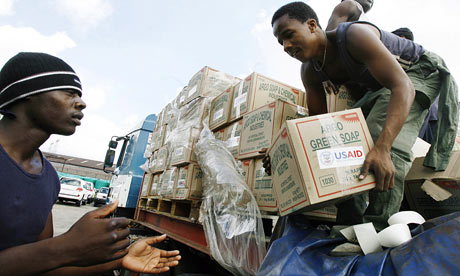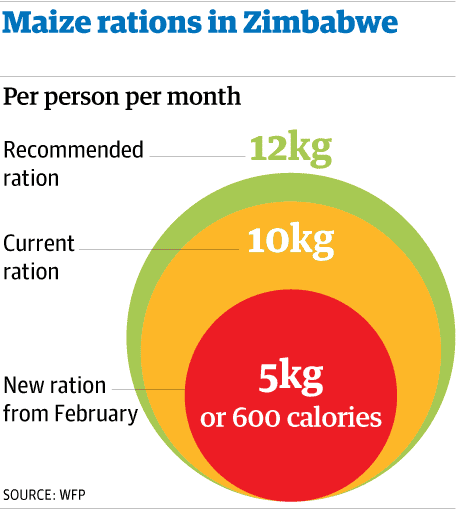
Aid workers offload supplies for people in Harare Photograph: Desmond Kwande/AFP/Getty Images
The United Nations is to halve the food ration to millions of Zimbabweans, bringing it below what will keep an adult alive, as the numbers of people dependent on aid rises sharply and donations from foreign governments fall well short of demand.
The World Food Programme is to cut the core maize ration in February from 10kg to 5kg a month – or just 600 calories a day – for 7 million Zimbabweans, about 70% of the people left in the country. The recommended ration is 12kg a month.
As a result of the cuts, many Zimbabweans will be fortunate to eat once a day. Millions have been left dependent on food aid because of years of crop failures mostly caused by the knock-on effects of the government's seizure of white-owned farms and the collapse of the economy and infrastructure. Most shops sell food only for US dollars because hyperinflation has wiped out the value of the Zimbabwe currency, and what is available is relatively expensive imports beyond the reach of the mass of unemployed and desperate Zimbabweans.
The WFP says it has cut the ration to meet increased demand and cope with a shortfall in donations. It says it requires another $65m to keep feeding Zimbabweans until the end of March. But donors are reluctant to put more resources into the beleaguered African state and what aid there is has been partly diverted to the cholera crisis that has claimed 3,000 lives.
Richard Lee, a WFP spokesman in southern Africa, said that while the calorie count would be boosted by a ration of beans and vegetable oil, recipients of food aid would now have to find additional means to stay alive.
"The new ration falls below what is considered the survival ration. They will be sending their children to hunt for wild fruits or selling the possessions they haven't already sold to buy food," he said. "People will be more vulnerable, they will be more malnourished and they will be more susceptible to disease."
Oxfam is feeding 253,000 in Zimbabwe's Midlands province. One of its workers there, Caroline Gluck, said the organisation relied on food supplied by the WFP and so would be forced to halve the ration.
"Families are being stretched. They're selling livestock, they're selling household goods to buy staple foods," she said. "People told us they were having a meal a day. Sometimes adults are skipping a meal so the children can be fed. They are supplementing what they have with wild fruits.
"But now it's going to be a disaster because people have sold what they can sell. There's very little they can do to supplement their rations. I think it's going to be extremely hard for families, it's going to make them incredibly vulnerable. You look at people and they are already thin, their frames are skin and bone. When you look at the fields you see there's been no agricultural inputs. The soil is little better than sand."
The WFP is already feeding about 4.5 million Zimbabweans, with a coalition of non-governmental organisations distributing to another million. Next month, the total number of Zimbabweans reliant on food aid will rise by 1.5 million.
"We are concerned. The reason we are cutting the ration is so we do provide assistance to everybody who needs food assistance so that we can make sure they can get through these two hungriest and worst months of the year, February and March, before the harvest starts in April," said Lee.
"But on top of that we haven't received all the resources we had hoped for. The donors have been very generous. We've now received over $200m for our operations in Zimbabwe in 2008 and 2009. It's just that the scale of the crisis, the worsening crisis, means that we do require additional resources."
The food shortages are contributing to the rising number of cholera deaths. About 1,000 people have died in the past fortnight, many of them too weak for treatment because they have not had enough to eat. Nearly 58,000 people have been infected.
The food crisis has been compounded by the government's failure to meet a target of importing 800,000 tonnes of maize. It is believed to have bought only 200,000 tonnes.
The April harvest is unlikely to bring relief. Agriculturalists say it will again fail; they estimate it will provide less than a quarter of the country's needs and that drastic food shortages will continue into next year once the results of the harvest have been consumed.




No comments:
Post a Comment